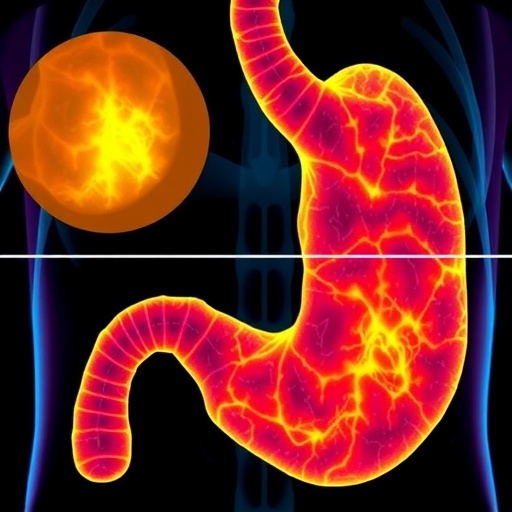In a groundbreaking study published in BMC Cancer, researchers have unveiled the prognostic power of the tumor index (TI) in predicting recurrence and survival outcomes for patients with pathological stage I gastric cancer (GC) who undergo radical surgical resection. This revelation marks a significant advancement in the clinical management of a disease long shadowed by unpredictable relapse patterns despite generally favorable prognoses in early stages.
Gastric cancer remains a formidable challenge within oncology due to its heterogeneous nature and variable clinical courses. Although pathological stage I GC is typically associated with good survival rates following curative gastrectomy, a perplexing subset of patients still encounter disease recurrence. Identifying reliable predictive markers for such recurrences has therefore emerged as a critical need in enhancing postoperative surveillance and tailor-made therapeutic interventions.
The recent multi-center retrospective cohort study incorporated 684 patients treated between 2010 and 2020. The patients hailed from two prominent medical centers, providing a robust and diverse data set for analysis. Researchers harnessed the tumor index, defined as the product of the pathological T stage and the tumor’s maximum diameter measured in centimeters, aiming to quantitatively stratify risk levels with greater precision.
This innovative index transcends traditional staging metrics by integrating tumor burden dimensions with depth of invasion, thereby offering a nuanced prognostic tool. Tumor size alone or T stage individually often fail to capture the complex biological behavior of early gastric cancer. TI addresses this gap by synthesizing these parameters into a single quantitative value.
Detailed statistical modeling, including Cox proportional hazards regression analyses, was employed to discern the relationship between TI and both disease-free survival (DFS) and overall survival (OS). The investigators documented a statistically significant association between elevated tumor index and poorer survival outcomes, underscoring TI’s potential as an independent prognostic biomarker.
Patients categorized with a high tumor index exhibited notably inferior DFS and OS, signaling a greater likelihood of postoperative recurrence and mortality risk within this ostensibly low-risk population. This finding challenges the conventional perception that early-stage gastric cancer uniformly portends favorable long-term outcomes and highlights the heterogeneity inherent in tumor biology.
Further analyses revealed meaningful correlations between high TI and specific clinicopathological features such as node-negative (N0) status, TNM stage IB, and positive perineural invasion (PNI). These associations underscore TI’s ability to capture subtle yet clinically relevant variations that influence tumor aggressiveness and patient prognosis.
The multivariate analysis substantiated that TI remained an independent predictor even after adjusting for confounding variables, with hazard ratios indicating approximately a twofold increased risk for disease recurrence and death. These robust statistical validations establish TI as a compelling candidate for integration into existing GC staging and risk assessment frameworks.
From a translational perspective, the utility of TI may extend beyond prognostication to inform individualized clinical decision-making. Patients with high TI values could potentially benefit from more intensive adjuvant therapies and stringent postoperative surveillance protocols, aiming to mitigate the elevated risk of relapse.
This study, therefore, propels the field towards a more personalized oncology paradigm in which molecular and phenotypic tumor characteristics are harmonized with anatomical staging to optimize patient outcomes. The simplicity of calculating TI using readily available pathological parameters further enhances its feasibility for widespread clinical adoption.
The authors advocate for prospective validation studies to corroborate these findings and explore the integration of TI into standardized guidelines for stage I gastric cancer management. Such endeavors could revolutionize current follow-up strategies and potentially improve survival metrics through early detection of recurrence.
Moreover, these revelations invite further research into the mechanistic underpinnings linking tumor size and invasion with biological aggressiveness reflected in TI values. Understanding these pathways may open new therapeutic avenues targeting early micrometastatic disease or tumor microenvironment modifications.
In conclusion, the tumor index emerges as a transformative biomarker with the capacity to refine prognostic stratification and optimize therapeutic approaches in pathological stage I gastric cancer. This study heralds a new era of precision medicine where quantitative indices complement conventional parameters to better capture individual patient risk profiles.
The impact of integrating tumor index into clinical workflows promises to be profound, potentially reducing the burden of overlooked recurrences and enhancing overall survival through timely intervention. As gastric cancer remains a leading cause of cancer mortality worldwide, innovations such as TI represent crucial strides toward improving patient care and survival outcomes on a global scale.
Such findings underscore the importance of continuous innovation in cancer biomarker discovery and the ongoing evolution of clinical oncology practices. The paradigm shift presented by the tumor index exemplifies how simple yet insightful measures can transform our approach to cancer prognosis and management.
Overall, Lin and colleagues’ study delivers an insightful, clinically relevant, and potentially practice-changing contribution to the oncology literature. Their comprehensive analysis poignantly illustrates how integrating tumor morphology with classical staging can unveil critical prognostic nuances previously unappreciated in early-stage gastric cancer.
Subject of Research: Prognostic significance of tumor index in predicting recurrence and survival in pathological stage I gastric cancer post-radical surgical resection.
Article Title: Tumor index predicts recurrences of patients with pathological stage Ⅰ gastric cancer after radical surgical resection.
Article References:
Lin, Y., Chen, H., Wei, C. et al. Tumor index predicts recurrences of patients with pathological stage Ⅰ gastric cancer after radical surgical resection. BMC Cancer 25, 1727 (2025). https://doi.org/10.1186/s12885-025-15157-x
Image Credits: Scienmag.com
DOI: 07 November 2025




